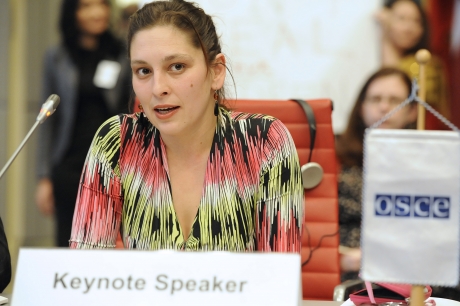Continued efforts to address the situation of Roma and Sinti needed, say participants of OSCE meeting
Governments should take steps to more effectively integrate Roma and Sinti communities, participants said at the opening of the Supplementary Human Dimension Meeting in Vienna, which runs until 8 November.

The meeting, jointly organized by the Ukrainian OSCE Chairmanship and the OSCE Office for Democratic Institutions and Human Rights (ODIHR), brings together government and Roma civil society representatives from OSCE participating States to review the current situation of Roma and Sinti, and lessons learned from the ten years since the commitment to the Action Plan on Improving the Situation of Roma and Sinti within the OSCE Area.
Ukrainian Ambassador Ihor Prokopchuk, the Chairperson of the OSCE Permanent Council, stressed the importance of addressing the situation of Roma and Sinti through continued commitment.
“The 2003 Action Plan remains the most comprehensive policy document addressing Roma and Sinti integration with concrete recommendations in the area of combating racism and discrimination, improving access to education, employment, housing and health services and enhancing their political participation,” Prokopchuk said. “Despite many positive developments in the OSCE area, greater efforts are needed to bring about equality of opportunities consistent with the OSCE commitments.”
Ambassador Janez Lenarčič, the Director of ODIHR, presented the second Status Report on the Implementation of the Action Plan which provides an overview of the present situation and highlights areas needing further attention.
“The findings of the new Status Report demonstrate that integration strategies and policy measures for Roma and Sinti inclusion have become a standard”, Lenarčič said. “Despite this positive development, ODIHR also identified worrying trends that seriously hamper the prospects for social inclusion of Roma and Sinti communities, in particular the increase in anti-Roma rhetoric and violence against Roma and Sinti.”
Keynote speaker Lívia Járóka, the sole Roma Member of the European Parliament and the Vice-chair of the Committee on Women's Rights and Gender Equality, outlined ways to address the lack of visible progress in key areas.
“Strategies must be brought closer to Roma. That is, Roma NGOs must be involved in the planning, implementation, monitoring and evaluation of programmes. We need authentic, independent and educated Roma to actively lead the public discourse on Roma and who work for the overall benefit of their communities,” said Járóka.
The aim of the meeting’s three sessions is to to generate concrete and realistic recommendations on how to address the existing challenges, especially those of Roma women and youth, and pave the way forward to ensure that Roma and Sinti have equal opportunities and are full and equal partners in OSCE societies.
Source: Organization for Security and Co-operation in Europe
- 455 reads
Human Rights
Ringing FOWPAL’s Peace Bell for the World:Nobel Peace Prize Laureates’ Visions and Actions

Protecting the World’s Cultural Diversity for a Sustainable Future

The Peace Bell Resonates at the 27th Eurasian Economic Summit

Declaration of World Day of the Power of Hope Endorsed by People in 158 Nations

Puppet Show I International Friendship Day 2020

